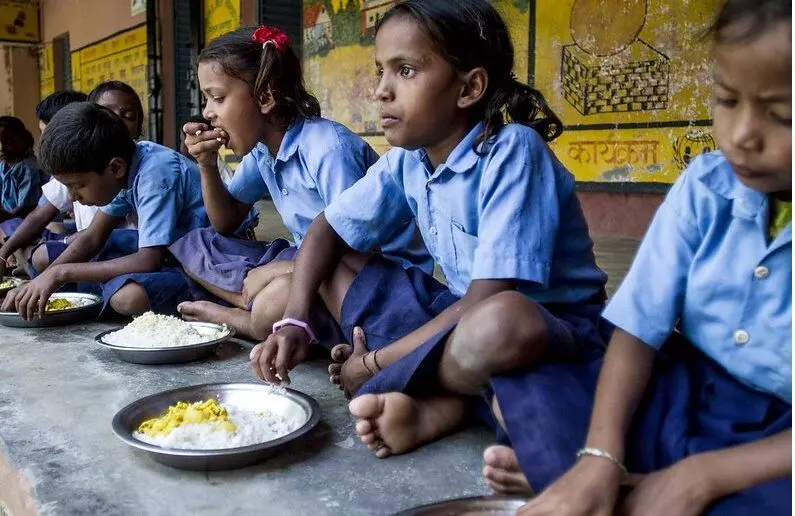India to benefit from UN initiative aimed at bettering school meals, curb malnutrition
The United Nations World Food Programme, upon receiving a financial grant from The Rockefeller Foundation, has come up with an initiative to help vulnerable children get better access to nutritious food through school feeding programmes in Benin, Ghana, Honduras, and India. Details here.
 गाँव कनेक्शन 18 Jan 2023 2:37 PM GMT
गाँव कनेक्शन 18 Jan 2023 2:37 PM GMT

As per the statement, school feeding programmes are the most extensive social safety net in the world, directly benefitting 388 million children globally.
India is amongst the four countries which are set to benefit from an initiative of the United Nations World Food Programme which seeks to check child malnutrition by providing nutritious meals at schools.
According to an official press statement issued by the United Nations body today, on January 18, upon receiving a financial grant of US$ 10.7 million by the New York-based The Rockefeller Foundation, the initiative is expected to directly impact the lives of millions of children in the countries of Ghana, Benin, Honduras and India.
“In India, the project will support the technical assistance provided by WFP [World Food Programme] to the government’s school feeding programme, directly benefitting 325,000 children, and seeks to reach more than 110 million school children through food fortification and communication campaigns that encourage healthier eating,” the press statement noted.
“In Benin, Ghana, and Honduras, the project is expected to directly impact the lives of more than one million school children. The project will also promote local food production, benefiting smallholder farmers, and provide school cooks with information on optimal nutrition for children,” it added.
As per the statement, school feeding programmes are the most extensive social safety net in the world, directly benefitting 388 million children globally.
“Studies have consistently shown these programmes can also support local agriculture, markets and healthier diets while improving health, nutrition and education in vulnerable communities. However, countries often struggle to provide adequate healthy foods to prevent malnutrition in school-aged children,” it stated.
The announcement of the initiative also took note of the recent phenomena which have worsened the food insecurity around the globe.
“More recently, school feeding programmes have also had to contend with the increasing costs of wheat and maize due to the combined effects of the Covid-19 pandemic and the war in Ukraine,” it mentioned.
Also Read: If children could vote: In poll-bound UP, high malnourishment but 66% POSHAN funds unutilised
The WFP further stressed that India invests over US$ 1.6 billion per year to reach 118 million children with hot cooked school meals, as part of subsidised monthly rations to more than 800 million individuals.
“Yet, a significant proportion of India’s population of 1.3 billion people still suffer from food and nutrition-related challenges. This USD 1.2 million project will strengthen supply chains and minimize food waste for rice, wheat and millet. It will reach up to 1 billion people through national-level operations research and advocacy. In addition, 325,000 school children will benefit from kitchen gardens in Rajasthan,” the WFP mentioned in its note.
Recently, as part of its Ten Part Series on the occasion of the 10th anniversary of Gaon Connection, a detailed ground report was published on the condition of hot cooked meals at anganwadi centres in Uttar Pradesh.
The report found that it’s been more than two years since children in Uttar Pradesh's anganwadi centres have been served hot cooked meals though most other states have resumed these meals post pandemic.
More Stories




